
Computing News Archive 1998-1999
Year 2000 is approaching fast
- are you ready?
Dialing changes to affect Penn modem pools
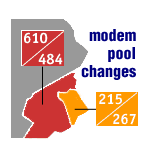
Due to the introduction of two new area codes in the Philadelphia region,
all users will soon need to dial a 10-digit number (the area code + the
phone number) to access any of Penn's modem pools. The 10-digit calling
system will become mandatory on June 5, 1999, replacing 7-digit phone
numbers. Bell Atlantic will permanently allow calls to be dialed as "1
+ ten" digits, but the "1" is not necessary.
The change is due to the Pennsylvania Public Utility Commission's decision
to use an area code overlay to double the number of area codes serving
Southeastern Pennsylvania, as the existing supply of numbers within each
area code is exhausted. With an overlay, the geographic boundaries of
the current area codes remain the same and current customers will keep
the same telephone numbers. An additional area code will be added to both
the 215 and 610 regions, and may be assigned to any new phone numbers.
For modem users, ISC recommends using 1 + 215 + number because this
will work both inside and outside the Philadelphia area. ISC has revised
its Point-to-Point Protocol (PPP) documentation (Macintosh,
Windows 95,
98, NT,
3.1x) to
incorporate the new dialing instructions as a way to help users make the
necessary changes during the December to June grace period. For more information
on the new area codes, see the Bell
Atlantic web site and Penn's
Telecommunications web site.
--John Mulhern III, Senior IT Support Specialist, ISC Client Services
Group (June 3, 1999)
Modem pool summer hours to begin on June 1, 1999

Beginning on June 1, 1999 and lasting until August 16, 1999, ISC Networking
will be raising the peak-time session limits on the PPP and CLI modem
pools from one hour to two hours. Peak time ranges from 6:00 PM until
midnight each day.
Session limits during off-peak hours will remain at four hours. ISC
Networking will be sending out a reminder early in August that sessions
will be returning to normal on August 16, 1999.
Have a great Summer!
--Michael Palladino, Executive Director, ISC Networking (May 26,
1999)
Changes to Penn's CLI modem service coming on May 18, 1999
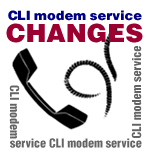
Penn's CLI modem service (215-898-0834), characterized by the annex
prompt, will be modified on May 18, 1999.
- New, year 2000-compliant server software will display a different
prompt - "HiPer" rather than "annex" - to users, and provide fewer functions
than were available previously.
- Because of the changes to the server software, existing scripts that
automate the dial-in procedure will not work as of May 18.
- Session limits similar to those in place for Penn's PPP dial-in services
will also come into effect.
Note also that the CLI modem service will be discontinued after June
30, 2000. Current users of the CLI service are encouraged to migrate to
the regular or express PPP service as soon as they can. For those not
yet able to migrate to PPP, details of upcoming changes to the CLI Pool
follow.
Those who use PPP software to dial in to Penn's regular PPP service
(215/573-4777) and the express PPP service (215/573-9773) will not be
affected by these changes (read MORE).
--Information Systems and Computing (April 27, 1999)
Networking service and rate changes for FY 2000

On July 1, 1999, several networking service and rate changes will go
into effect. These changes are a result of recommendations made by the
Network Planning
Task Force, the cross-campus team that meets to discuss and resolve
issues surrounding the planning and funding of PennNet.
Information Systems and Computing (ISC) is making the following networking
service and rate changes based on the Network Planning Task Force's recommendations:
- On July 1, 1999, ISC will discontinue asynchronous desktop connections.
- E-mail accounts on Dolphin are no longer supported by the ResNet construction
budget and so Schools and centers who rely on this service will be billed
$17 per account per year. It will be up to the Schools and centers to
determine whether to pass these charges on to end users.
- 10Base2 monthly connection rates will increase from $26.00 to $30.00.
Users are encouraged to switch from 10Base2 to 10Base-T connections
through ISC's conversion program.
- 10Base-T monthly connection rates will decrease from $19.25 to $16.45.
The table below shows a breakdown of the monthly fees for a 10Base-T
connection in FY 1999 and FY 2000 (read MORE).
--Michael Palladino, Executive Director, ISC Networking (April 6,
1999)
E-mail alert for Pobox and Dolphin!

Early on March 1st, after consultation with local mail administrators
and support providers, Information Systems & Computing (ISC) will
discontinue support for open SMTP relay through its e-mail hosts Dolphin
and Pobox, as well as smtp-relay.upenn.edu. This change is necessary to
quickly address serious problems related to inappropriate use (spamming)
of these resources by parties outside the University, which led some other
e-mail hosts to refuse mail from these systems.
You will be affected by this change only if all three of the following
conditions are true:
- You use an external Internet Service Provider (such as DCANet, Netcom,
etc.) and
- You use a POP or IMAP e-mail client such as Eudora or Netscape and
- You use Pobox or Dolphin as your mail host
You will not be affected by this change if you meet one or more of
these conditions:
- You connect to Pobox or Dolphin from an on-campus Ethernet connection
or via Penn's modem pool
- You use Elm or any other host-based e-mail client to access your mail
from off campus
- You connect to mail hosts other than Pobox and Dolphin
We have made best efforts to notify all those likely to be affected
by this change. However, if you begin experiencing problems sending your
mail on March 1st, the difficulty may be a result of this change. You
can correct this problem by reconfiguring the SMTP settings in your e-mail
client.
Note: If you connect to your e-mail host via an external
Internet Service Provider and also an on-campus Ethernet connection using
the same computer, you will have to reconfigure the SMTP settings each
time you change locations.
Please follow the SMTP configuration instructions below for Penn's supported
POP and IMAP e-mail clients:
If you have questions or need assistance, please contact your local
support provider. Local support providers with questions can contact
the ISC Provider Desk at prodesk@isc.upenn.edu
or 573-4017.
--Dave Millar, University Information Security Officer (February 25,
1999)
Apple's second generation G3s
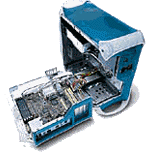
On January 5, 1999, Apple Computer introduced the second generation
of G3 minitower systems (otherwise known as the "blue" G3s because
of their new coloration). These systems are probably the most significant
technological advance for Apple since the original Power PCs in 1994.
They include FireWire, Universal Serial Bus (USB), and an advanced industrial
case design with extreme ease of access to the motherboard (read MORE).
--John Mulhern III, Senior IT Support Specialist, ISC Provider Desk (January
15, 1999)
ISC lowers rate for 10Base-T connections
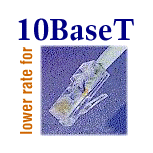
Information Systems and Computing (ISC) lowered its monthly rate for
ISC-supported 10Base-T Ethernet connections on October 1, 1998. The rate
reduction is part of a program to encourage the University community to
complete the transition from 10Base2 (coax) to 10Base-T (twisted-pair)
Ethernet wiring and connections. The newer unshielded, twisted-pair cable
(called Category 5), coupled with switched electronics, allows for greater
bandwidth, faster speeds, and quicker problem resolution.
The new rate is $19.25 a month per 10Base-T connection, a $3.00 per
month decrease. A further rate reduction is expected on July 1, 1999.
By comparison, the 10Base2 rate is currently $26.00 a month per connection
and is expected to go up to $30.00 a month per connection on July 1, 1999.
ISC Networking will also continue to convert existing 10Base2 connections
to 10Base-T free of charge between now and June 30, 1999. The $91.00 fee
per 10Base-T connection will be waived for clients who ask ISC to disconnect
an existing 10Base2 connection and simultaneously activate a new 10Base-T
connection in the same wall plate or room. The free conversion offer is
applicable only on ISC-supported 10Base2 connections and excludes new
wiring charges that may be needed.
In addition, since 10Base2 connections are no longer strategic and are
not likely to be supported for more than two or three years, ISC will
no longer install coax cables for new 10Base2 connections as of January
5, 1999.
For new installations or to schedule a conversion, please call 898-9654
or send e-mail to installs@isc.upenn.edu
(read MORE).
--Michael Palladino, Executive Director, ISC Networking (November
3, 1998)
Mac OS 8.5 release
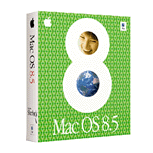
Mac OS 8.5 (code name "Allegro"), released on October 17th, 1998, is
the latest version of Apple's flagship operating system.
Please note that Information Systems and Computing (ISC) is not currently
recommending an upgrade to Mac OS 8.5 for existing systems, but expects
to see systems shipping with Mac OS 8.5 later in October. Further, ISC
recommends that Mac OS 8.5 only be installed on Macintosh and Mac OS-compatible
computers that meet these minimum requirements:
- Any PowerPC with 32 megabytes of RAM
Mac OS 8.5 only works on Power Macintoshes and PowerPC-based Macintosh
clones--Mac OS 8.1 was the last version of the operating system to support
Macintoshes with the 68040 processor.
The full install of Mac OS 8.5 uses between 85 and 265 megabytes of
hard disk space, depending on the type of Power Macintosh and choices
made during the install.
For more detailed information, including compatibility, conflicts, and
pricing, see the Mac
OS 8.5 page.
--John Mulhern III, Senior IT Support Specialist, ISC Client Services
Group (October 23, 1998)
Year 2000 reminder
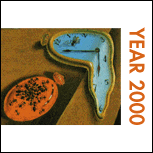
The Year 2000 problem continues to receive international attention as
its "deadline" moves ever nearer. The University has made significant
progress, but much remains to be done. The Almanac recently published
a letter
to the University community from Provost Michael Wachter and Executive
Vice President John Fry, reminding us of our obligation to manage the
risks presented by this real and serious problem.
The University's Year 2000 web site
is a good starting point to find out more about the issue. It contains
links to both Penn-specific and other material of interest to faculty,
staff, and students.
--Michael Kearney, IT Technical Director, ISC Administrative Technologies
(October 14, 1998)
PennConnect CD-ROM network applications fall 1998
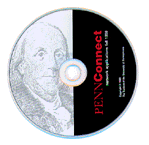
Information Systems and Computing has released the PennConnect CD-ROM
for fall 1998, which contains the recommended networking and anti-virus
software for off-campus students, staff, and faculty, as well as on-campus
ResNet students. The CD-ROM includes PPP (Point-to-Point Protocol) software,
which allows for remote connectivity to PennNet; the recommended Web browser;
and other Internet applications including clients for Telnet, e-mail,
and NetNews.
Also available are documents for configuring your system to dial into
PennNet via modem, for connecting to PennNet from an on-campus ResNet
building, and for installing and configuring the network applications.
This CD-ROM is cross-platform and works on Mac OS, Windows 95/98, Windows
NT, and Windows 3.11. Copies of the CD-ROM are available for many faculty
and staff directly from their local
support provider or at the Computing Resource Center, Suite 202, Sansom
West (Graduate Tower B), 3650 Chestnut Street, hours M-F, 9-4:30. The
software is also available for download from the software distribution
area of Penn's FTP server, ftp.upenn.edu/pub/.
--Mary Griffin, Senior IT Support Specialist, ISC Client Services Group
(September 3, 1998)
Supported products update

The Supported Products page on the
Penn Computing Web has been updated to reflect the recommended products
for the 1998-99 academic year. The index provides an at-a-glance view
of the supported software and hardware products for both Mac OS and Windows.
Each product is linked from this index page to a "spec sheet," which provides
a brief description of the product; availability, configuration, support,
and year 2000 compliancy information; and links to related resources.
Where appropriate, products are available for download from Penn's FTP
server right from the spec sheets.
--Mark Aseltine, Director, ISC Provider Support Services (August 28,
1998)
Support for Windows NT Workstation 4.0

Following a period of training, preparation, documentation, and testing,
ISC rolled out limited support for Microsoft Windows NT Workstation 4.0
on July 1, 1998. This support from ISC consists of, among other things:
--Mark Aseltine, Director, ISC Provider Support Services (August 28,
1998)
Computing News Home |
2002-2003 archive |
2001-2002 archive |
2000-2001 archive |
1999-2000 archive |
1998-1999 archive |
1997-1998 archive
|